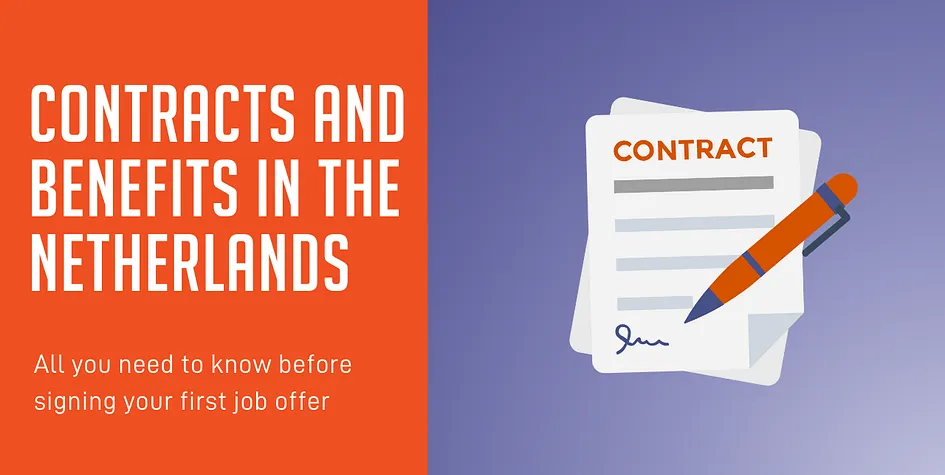Want some help figuring out your Dutch life and career? Check out our downloadable resources for more information about living and working in the Netherlands.
Contracts and Benefits in the Netherlands

Starting your career in the Netherlands is a great choice! With a great work-life balance and an international atmosphere, the Netherlands is a lovely place to work and live. It can take some adjusting when you enter a new labour market though, especially when it comes to the ins and outs of employment contracts and figuring out which benefits you can expect to be offered by your new Dutch employer.
We recently hosted a Contracts and Benefits in the Netherlands webinar to discuss this very topic, covering everything from labour laws and contract structures in the Netherlands, to working with a recruitment agency and common benefits in the Dutch job market. We want you to have all the information about common contract types and the secondary benefits you can expect, so that you can feel fully confident putting pen to paper on your new contract in the Netherlands
For all the details you can check out the webinar recording here, or keep reading to get the highlights.
Alright, let’s dive in to your crash course in Dutch contracts and benefits.
Working with a Recruitment Agency: Your New Best Friend
First things first, it is good to know that working with a recruitment agency is likely to be part of finding a job in the Netherlands. While this is not common practice everywhere, in the Netherlands agencies are at the center of most recruitment activities, so there is a good chance that you will speak to an agency recruiter or two who will help you on your way while you are searching for a new job here.
Recruiters get to know both you and the company well so that they can play ‘career matchmaker’ and connect you with interesting opportunities. They will help you prep your application and introduce you to companies with open vacancies that match your skillset and ambitions. Plus, they can help guide you through the Dutch job market and answer any questions you have along the way. They are like that friend who knows everyone and can help hook you up with the perfect job opportunity. And the best part? Working with an agency recruiter is free to job-seekers, so it's a win-win for you.
Dutch Contracts: What to expect
Just like the Dutch habit of working with an agency might be an adjustment, the way that contracts work in the Netherlands might be new to you as well.
The Netherlands is known for having a great work-life balance, and for creating lots of laws and legislation to make sure everyone's treated fairly. So, buckle up for a quick crash course in Dutch labour law!
Don’t worry we won’t overwhelm you with too much legalese, but we are going to give you a peek into what you need to know so that you can be prepared when you are offered a contract in the Netherlands.
Temporary vs. Permanent Contracts
The first good thing to know is that most companies will usually start new employees off with a temporary contract. Sometimes this is because the role is a short-term opening, such as covering a maternity leave or project-based work, but it is also common practice to start with temporary contracts for long-term roles as well. This gives you time to settle into the role and for both you and the company to determine if it is a good fit. If things go well, you will most likely end up with a permanent (or indefinite) contract eventually. This is usually the intention of companies for long-term roles, so don’t be discouraged if you are offered a few temporary contracts before bagging the coveted permanent contract.
The 3x3 Rule
Speaking of those temporary contracts, there is a limit to how many you can receive before getting a permanent offer. Here's a fun way to remember – the 3 x 3 rule. This stands for 3 contracts within 3 years, meaning that a company can offer you up to three temporary contracts within three years’ time. Are you being offered your fourth contract or have you passed the three-year mark? Then it is time for a permanent contract.
Agency Contracts
If you are working through an agency, things get a bit more interesting. You might hear terms like "Phase A," "Phase B," and "Phase C" (or 1-2, 3, and 4 if you're feeling numerical). These phases refer to the stage of temporary contract that you are currently working in which can help you identify the associated requirements and applicable regulations. In general, the longer you work the more stable your situation becomes.
But we are getting ahead of ourselves. First of all you probably want to know, what an agency contract even is. Simply put, an agency contract is an employment contract that you enter into with a recruitment or employment agency to work at a third-party company. When you are hired you sign a contract with the agency and all administration will be handled by them, but your daily tasks will be completed at another company. This setup offers more flexibility, allowing you to work longer on a temporary basis (up to four years), which can be beneficial for both you and the company.
The ABU (Dutch Federation of Private Employment Agencies) ensures that temporary agency workers are protected and treated fairly by frequently updating the collective labor agreement (CLA) that applies to all temporary agency workers. Agencies, such as Undutchables, that are part of the ABU (or NBBU), adhere to the CLA and follow a contract phase system to make sure that the rights of temporary workers are handled with care. The phase system includes the following contract phases:
This is just a quick overview to give you an idea of what to expect with each type of contract you can receive. The phase you are in will be outlined in your contract and/or explained by the agency. They can also help you understand how your contract works and the rights and regulations associated with it, or you can refer to the CLA for Temporary Agency Workers for more specifics.
Benefits: The Cherry on Top
Now, that you have used so much brain power to dive into the nitty-gritty of contracts, let’s move on to the fun part – benefits! Secondary benefits can vary largely between countries, so it is nice to know what to expect now that you will be working in the Netherlands. Thanks to some important Dutch laws protecting workers, plus the culture’s commitment to a great work-life balance, you are in for some pretty nice perks.
Phase A (1-2): This is the initial phase of a temporary agency contract. It does not typically include an end date and allows for flexibility for both parties. It lasts up to 52 worked weeks and you can have an unlimited number of contracts within Phase A. In this phase you can have an on-call contract, where your working schedule is determined weekly or monthly, or a more defined contract that includes specific working hours per week. In Phase A you are paid for the hours that you work, so if you do not work there is no payment of wages for those hours (except for previously defined benefits such as vacation days, etc.).
Phase B (3): After completing Phase A you will move on to a Phase B contract. This type of contract provides more stability as it contains a defined end date, longer notice period, and specific weekly hours. Because of the specifically defined working hours this type of contract also includes the continued payment of wages. In Phase B you can have up to six contracts within three years.
Phase C (4): After completing Phase B you may move on to Phase C. This is a permanent or indefinite contract that you enter into with the agency (not the third-party company). Keep in mind that not all agencies offer this option because they need to be able to provide consistent work for you and this is not always possible, especially for niche agencies. It is more common for certain fields, such as medicine or logistics, where they are frequently looking for workers.
The Must-Haves
By law, you are already entitled to some awesome benefits. Here is a list of some of the main benefits you can expect to have included in your contract no matter which company or sector you will be working in.
- Minimum wage – In the Netherlands you are entitled to a salary that is at or above the legal minimum wage (€13.68 per hour as of July 2024).
- Vacation days – If you are working full time you will have a right to at least 20 days of vacation per year. Time to see the world!
- Holiday pay - Every worker in the Netherlands has a right to an extra 8% of their annual salary. It will usually be paid out around May so that you will have a little extra cash to use on your vacation.
- Sick leave – Everybody gets sick sometimes and the Dutch understand this so they've got your back when you are under the weather.)
- Maternity and parental leave – In some countries this is a benefit that comes later, but in the Netherlands it is a standard, legally protected benefit that you have a right to from day 1.
- Participation in social insurances – That way you are covered when it comes to things like retirement, sickness, unemployment, etc.
The Nice-to-Haves
While all companies must offer the legally required benefits, many companies also go above and beyond to provide you with an even nicer benefits package. Some common benefits include (but are not limited to):
- Travel cost compensation for your daily commute
- 13th month or extra payment at the end of the year
- Extra vacation days
- Bonus structure (especially for commercial positions)
- Compensation for irregular hours/shifts
- Company provided lunch
- Hybrid work options
- Education reimbursement (time to learn Dutch, perhaps?)
It is also becoming popular to offer flexible benefits packages where each employee is given the option to choose which benefits they prefer from a multiple choice menu. In this way the benefits package can be tailored specifically to the needs and desires of the employee.
The Lucky-to-Haves
Some benefits are rarer than others. For instance, company cars and mobile phones are not super common unless you are in a sales position, or always on the road. Another important one to note is that, unlike in many other countries, health insurance is typically not a part of the benefits package in the Netherlands. Some companies do offer discounts with certain insurance providers though, and recent trends show that more companies are starting to jump on the wagon and provide health insurance as a benefit in your contract, so you might just get lucky.
The Latecomers
While many benefits are simply part of your contract from the very beginning there are also a few benefits that may take some time to come into effect. For instance:
- The ability to request different working hours/location – This is due to a law called the Flexible Work Act. If you have been working for an employer for at least 26 weeks (6 months) then you can put in a request to change things about your working situation such as how many/which hours you work, your work location (i.e. more hybrid or another office location), or to request more stability (especially if you have an on-call contract for instance). In theory the employer should approve the request unless there is an important reason why this is not possible and would affect business negatively.
- Participation in the bonus scheme – Sometimes your eligibility to participate in the bonus scheme only applies once you have been in the company for a certain amount of time (i.e. 6 months or after completing your first contract).
- Working from home – Many companies prefer to do live training in the office and wait until employees are more self-sufficient to allow you to work (more) from home.
Of course there are many more benefits that we have not named, and you can always negotiate for other benefits as long as they do not conflict with the law or the CLA, but this should give you an idea of the most common benefits that you will come across.
The Bottom Line
Working in the Netherlands comes with a lot of perks and protections. The Dutch value work-life balance, and it shows in their approach to employment. Although navigating the landscape of paperwork for your new job can be overwhelming, we hope that this overview will help you to have a better idea of what to count on and where to look if you have questions. Just remember to read your contract carefully (in a language you understand!) and don't be afraid to ask questions or negotiate.
So there you have it – your crash course in Dutch contracts and benefits. We hope this helps you the when the time to sign your contract comes along. Now go forth and conquer the Dutch job market! And remember, if you ever feel overwhelmed, feel free to reach out and we will be happy to help you out. Good luck!
This is a recap of our candidate webinar, ”Contracts and Benefits in the Netherlands”. You can review information included in the blog and more by rewatching the full session on our YouTube channel. Enjoy!

Find out more with our downloadable resources

Looking for a job?
Undutchables offers a variety of vacancies. Check out the latest job offers and apply.
We look forward to your application.

